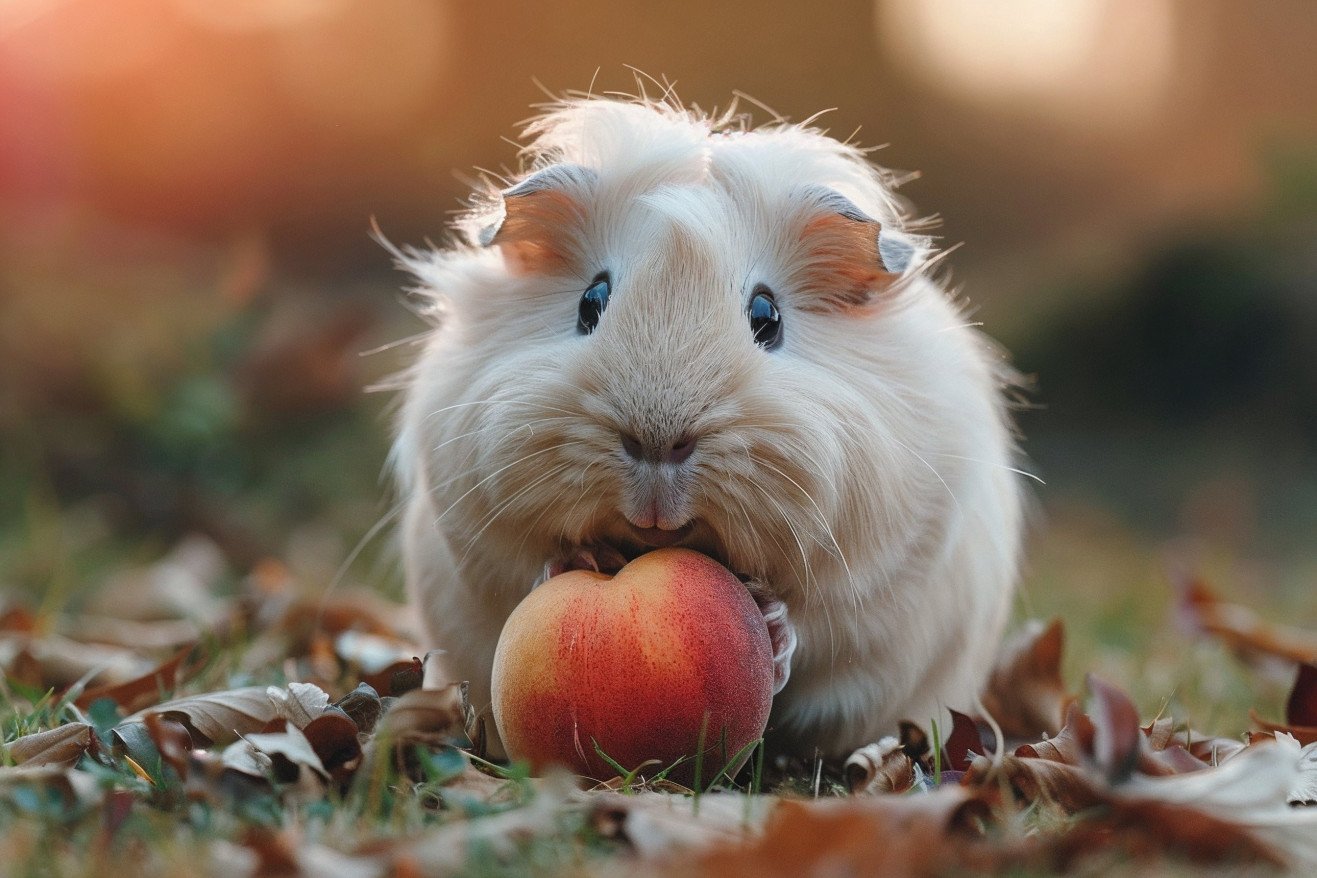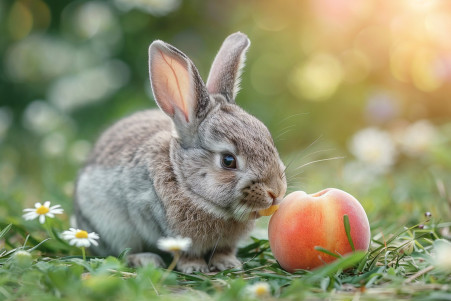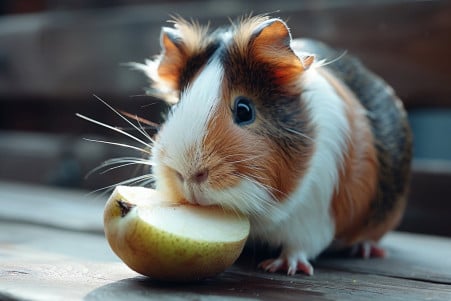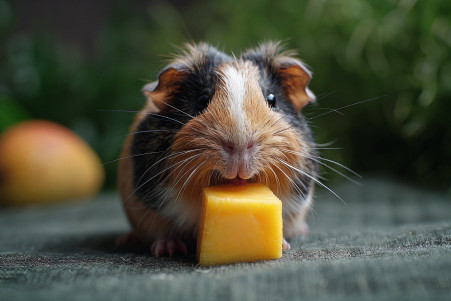Can Guinea Pigs Eat Peaches? Nutrition and Safety Guide
28 February 2024 • Updated 27 February 2024

Sweet and juicy, peaches are one of the best parts of summer, but can our guinea pig pals enjoy them too? Guinea pigs can eat peaches as an occasional treat in small amounts. While peaches are high in vitamin C and can help with hydration, their high sugar and acidic content can lead to digestive upset and mouth sores, so they should be fed in moderation.
We will take a deep dive into the nuances of a guinea pig’s diet by looking at both veterinary science and animal nutrition. Our focus will be on the interplay of vitamins, minerals, and potential risks found in fruits such as peaches.
With the help of insights from small animal veterinarians, we will break down the dos and don’ts of adding treats to your guinea pig’s diet so that you can make sure you’re keeping your pet healthy while also being a responsible pet owner.
Can guinea pigs eat peaches?
Nutrients in Peaches and How They Can Help Guinea Pigs
Peaches, with their juicy sweetness, are more than just a treat; they are also full of important nutrients that can benefit your guinea pig.
According to Medical News Today, one cup of peaches contains 11.1 milligrams of vitamin C, which is a significant amount of the daily recommended intake. This is an important antioxidant that guinea pigs need because they can’t produce it on their own, and it helps protect against disease and maintain healthy skin.
The 2.52 grams of fiber in peaches per cup can help with digestion, which is important since guinea pigs need a diet that is high in fiber. In addition, Healthline explains that peaches are also high in vitamins A, E, and K, and they contain minerals such as potassium, niacin, and copper, which can all help ensure that your guinea pig is getting a well-rounded diet.
That said, it’s important to be mindful of the sugar in peaches. With about 14.10 grams of sugar per cup, peaches are naturally sweet, and you want to make sure that you don’t give your guinea pig too much sugar, which could throw off their diet. Everyday Health suggests that you make sure that your guinea pig’s diet is balanced so that they can get the benefits of peaches without any potential downsides.
Incorporating peaches into your guinea pig’s diet will also add a pop of color to their meals—occasional helpings will improve their health and happiness.
How to Meet Your Guinea Pig’s Nutritional Needs
Guinea pigs have a specialized digestive system that has evolved to eat a diet that is high in fiber and low in sugar, and that is made up of grass and other tough, fibrous plants. As a result, their gastrointestinal tract, including a large cecum that is full of microorganisms that help digest and absorb nutrients from food, is designed to break down fibrous food.
This means that the majority of a guinea pig’s diet should be hay, which should make up about 80% of their daily food intake, according to The Humane Society.
Vitamin C is another important part of a guinea pig’s diet. While many animals can synthesize their own vitamin C, guinea pigs cannot. As a result, if guinea pigs don’t get enough vitamin C, they can develop scurvy.
This makes it important for pet owners to make sure that they are feeding their guinea pigs foods that are high in vitamin C or giving them a vitamin C supplement to ensure that they are getting enough of this important nutrient.
A well-balanced diet for a guinea pig includes unlimited access to high-quality hay, a variety of fresh vegetables, and a small amount of fortified pellets that contain stabilized vitamin C.
In addition, pet owners can also feed their guinea pigs treats like peaches or other fruits and vegetables. However, it’s important to introduce treats slowly, as this will allow pet owners to make sure that their guinea pigs don’t have any negative reactions to the new food and to avoid digestive issues.
That said, feeding treats in moderation can help ensure that guinea pigs have a varied and interesting diet that keeps them happy and healthy.
Everything in Moderation: Can Guinea Pigs Eat Peaches?
While peaches can provide some health benefits to guinea pigs, there are also some risks to consider. For example, the high sugar content in peaches can lead to digestive upset in guinea pigs.
A study posted in PMC on the effects of dietary sugars in diabetic rats explains that the risk of caloric imbalance and increased body weight could be a concern for guinea pigs as well. While the natural sugars in peaches are less concerning than added sugars, they still need to be monitored to avoid obesity and its associated health problems, according to Supreme Petfoods.
The acidity in peaches can also be problematic and lead to mouth sores in guinea pigs. For this reason, GuineaDad suggests that you start by introducing peaches to your guinea pig’s diet slowly. You can start by giving them a small slice once or twice a week, but no more than that, and see how they respond.
To make sure that peaches are a good addition to your guinea pig’s diet, keep an eye out for any signs of digestive upset, including changes in the consistency of their stool, a lack of interest in eating, or signs of discomfort. If you notice any of these symptoms, it’s best to err on the side of caution and remove peaches from their diet, and then talk to your vet.
This way, you can make sure that any dietary changes you make will have a positive impact on your guinea pig’s overall health and well-being.
Dealing With Allergies and Sensitivities in Guinea Pigs
Guinea pigs, like people, can have allergies and sensitivities that pet parents need to be aware of when introducing new foods like peaches. For example, PetHelpful notes that some of the most common allergens for guinea pigs are found in certain types of bedding, like cedar shavings, which have oils that can cause skin rashes and respiratory problems.
Meanwhile, hay dust can cause respiratory issues, although the GuineaDad Hay Bar and Hay Box are designed to reduce the amount of hay dust that guinea pigs are exposed to.
When you’re introducing peaches or any other new food, it’s important to do so in small amounts. GuineaDad recommends that pet parents look for signs of allergic reactions or digestive issues, such as diarrhea or changes in urine, and notes that it’s important to be patient when you’re trying to figure out whether a guinea pig has an allergy or sensitivity to a new food.
In addition, choosing organic fruits and vegetables can help reduce the amount of pesticides that guinea pigs are exposed to, which can help protect their health.
It’s also important to make sure that your guinea pig’s living environment is free of allergens. This can be done through spot cleaning and using bedding like the GuineaDad Liners, which are dust-free and can help ensure that your pet has a safe and comfortable place to live.
By doing this, you can make sure that you feel comfortable giving your guinea pig a piece of peach and watching them enjoy it, knowing that you’re keeping them safe.
The Bottom Line: Can Guinea Pigs Eat Peaches?
To sum it up, peaches can be a tasty treat for your guinea pig as long as you feed them in moderation. They can help keep your pet hydrated and provide important nutrients, especially vitamin C, which is essential to your guinea pig’s diet. However, because peaches are high in sugar and acidic, you need to be careful to avoid potential health problems like digestive issues and mouth sores.
The key to feeding peaches to your guinea pig safely is to understand their specific dietary needs, which are based on a diet that’s high in fiber and low in sugar. It’s also important to understand that certain treats can come with risks, including the possibility of allergies and sensitivities.
In conclusion, when it comes to feeding your guinea pig peaches, and other treats for that matter, it’s important to remember that they should be just that—a treat, not a regular part of your pet’s diet. Work with your vet or a board-certified veterinary nutritionist to get personalized advice on the best dietary choices to help ensure your guinea pig lives a long and healthy life.
Enjoy the fun of providing a diverse and nutritious diet, but make sure to do so with caution to ensure a happy and healthy pet.


